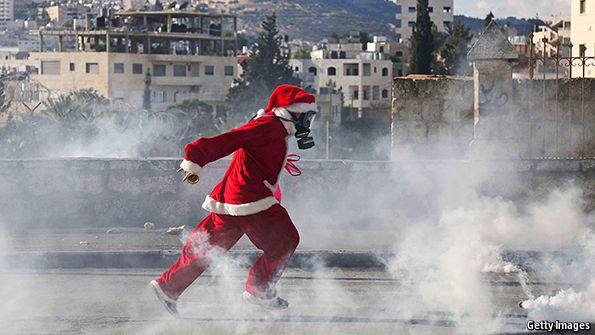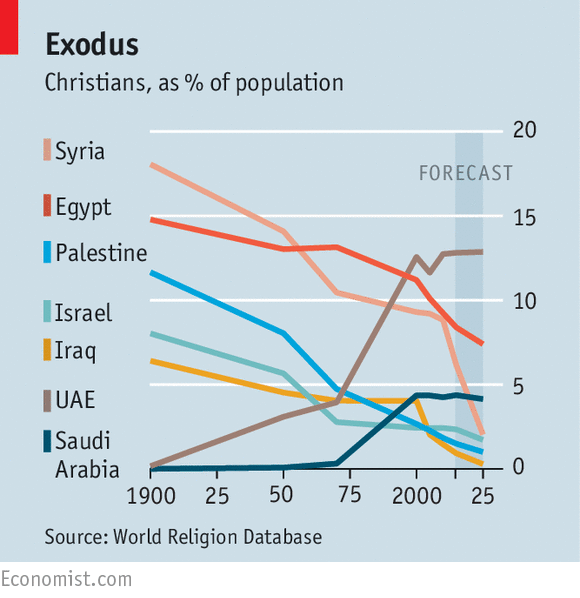Christianity in the Middle East
"Despite all your suffering, stay! Be patient! Don’t emigrate! Stay for the church, your homeland, for Syria and its future!"In Bethlehem, fondly rgarded as the birthplace of Christ, there are few Christians left; they have migrated elsewhere, victims of persecution by their Arab Muslim brethren. But the quaint, colourful customs of Christmas continue in Bethlehem. Palestinian Authority President Mahmoud Abbas makes it a point to attend Christmas church service as a gesture of solidarity with the Christians who are no longer there.
"[Europe, forbear and do not] encourage Syrian Christians to emigrate."
Syrian Catholic leader Melkite Patriarch Gregory III
"There will be lights, parties, Christmas trees and Nativity scenes."
"It’s all a charade."
"We should ask for the grace to weep for this world, which does not recognize the path to peace."
Pope Francis
"In Iraq, when Saddam Hussein was removed, we lost a million Christians."
"Why? Not because the regime fell, but because there was no more authority, there was a vacuum. In Syria, it’s the same thing, Christians do not back the regime [of Bashar al-Assad], but they are afraid of what may come next."
Bechara Boutros al-Rahi, Lebanon’s Maronite Christian Patriarch
Bethlehem aspires toward attracting tourism as a world heritage site. But Christians are also wary of the lack of esteem in which they are held. They fail to appreciate the decorations faithful to the season meant to attract foreign visitors wishing to visit the site and are willing to act the temporary part of Christians. Less the violence where young Palestinians throw rocks at Israeli soldiers at the wall separating the West Bank from Israel.

The tear gas that the soldiers lob back at the Palestinians creates a fog of indifference by Muslims to the the hypocrisy of venerating one version of god while denigrating the other, earlier version as false. The despicable disregard for the minority religions around them which holds Christianity to be an insult to Islam and the violence that accompanies that venomous disrespect sees churches burned, Christians threatened and their right to the sanctity of life in abeyance.
In the very cradle of Christianity, there is a scant 4% existence of Christians remaining among the vast sea of Muslim detractors. The low-grade persecution throughout the Middle East of the indigenous Arab Christians has more recently witnessed the horrific spectacle of Islamic State jihadists inflicting atrocities on the despised Christians. In one incident whose vile butchery enervated Christians, a video showed three Assyrian Christians forced to kneel, then shot in the head by ISIL jihadists.
There is a variance in the birth rate between Christians and Muslims; Coptic Christians in Egypt have a fertility rate of 1.9, while that of Muslims is 2.7. In northern Iraq, Mosul was home to tens of thousands of Christians when a wave of killings took place in 2008, which included the murder of the Chaldean archbishop. When ISIL arrived in 2014 Christian homes had an "N" (for "Nazarene") placed on the exterior, their occupants given the choice to convert, pay the jizya or face death. The Christians fled.
| The snow-covered golden Dome of the Rock Islamic shrine in the Old City is seen behind a detail from the glass-and-lead window of Dominus Flavit, a Catholic chapel on the Mt. of Olives, on January 31, 2008 in Jerusalem, Israel Getty Images |
Arab Christians found protection when strong dictators ruled the land. Keeping the peace and maintaining order, although the situation was always tenuous and they suffered minor indignities, violence was kept at bay when Christians gave their support to the dictators. In Egypt, the late Pope Shenouda III, of the Coptic church, the largest in the Middle East, gave his trust to former dictator Hosni Mubarak, discouraging Copts from joining protests that succeeded in toppling his rule. When Tawadros II succeeded, he supported Abdel-Fattah al-Sisi who maintains a level of order protecting Copts.
In the most piquant of ironies it is in the Gulf States where there was always a paucity of Christians that their number has accelerated. They come from the Asia-Pacific as labourers. As migrants they will never be anything but migrant labourers, citizenship will always be denied them. They have no roots in the Gulf, where the most conservative Islam is practised. By no means do these migrants lead a particularly pleasant life; they have few workers' human rights, but the allure of steady work, sending their wages back home keeps them there.
Christians now live in Saudi Arabia and the United Arab Emirates, though their Christianity must be maintained at a low, inconspicuous level. While Saudi Arabia bans Christian practise, leaving the Asian Christians to worship in private, the UAE permits churches to be erected. Nonetheless, states Father Paul Karam, president of a Catholic charity in Lebanon, once a majority-Christian country, now in the minority: "Christians are not guests in the Middle East.We are the original owners of the land."
Much good that will do them. (Guess he forgot Judaism, predating Christianity.)
Labels: Christianity, Islam, Middle East

0 Comments:
Post a Comment
<< Home